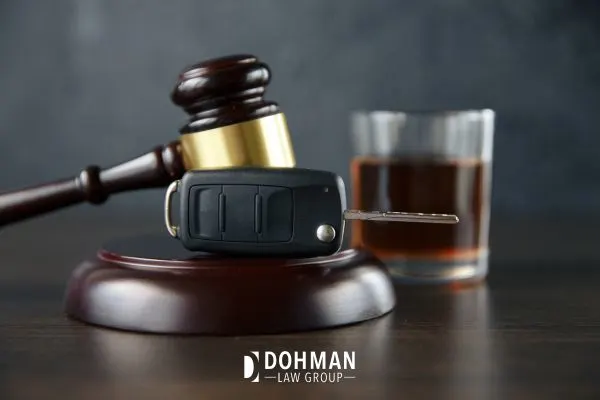- Understanding DUI Laws in Lake County, Illinois
- Potential Consequences of a DUI Conviction
- Defense Strategies to Fight DUI Charges in Lake County
- Field Sobriety and Chemical Tests in Illinois
- License Reinstatement and Restricted Driving Permits After a DUI
- Frequently Asked Questions About DUIs in Lake County
- Contact Dohman Law Group for a Free DUI Consultation
A DUI charge can feel overwhelming, but you don’t have to navigate it alone. At Dohman Law Group in Lake County, we’re here to guide you through the entire DUI defense process. Our team understands how important your license, freedom, and future are. We’re dedicated to helping you protect them. Whether it’s your first DUI or you’ve faced charges before, we’ll work hard to explain your options and fight for the best possible outcome. If you’re ready to discuss your situation, reach out for a free consultation.
Let’s tackle this challenge together and get you back on track! Call now at (847) 616-9993.
Understanding DUI Laws in Lake County, Illinois
DUI laws in Lake County, Illinois, are designed to keep everyone on the road safe. DUI stands for Driving Under the Influence, which means operating a vehicle after consuming alcohol or using drugs that impair your ability to drive safely. In Illinois, if your blood alcohol concentration (BAC) is 0.08% or higher, or if drugs impair your driving, you could face serious consequences. These include license suspension, significant fines, or even jail time. These laws apply to anyone driving in Lake County and serve as a reminder to make responsible choices behind the wheel.
Legal Blood Alcohol Content Limits
- 0.08% for adults over 21.
- 0.04% for commercial drivers.
- 0.00% under Zero Tolerance for drivers under 21.
DUI charges in Lake County can be either misdemeanor or felony offenses. A misdemeanor DUI is generally less severe and typically applies to a first offense. However, a DUI can become a felony charge if you have prior convictions, caused an accident with property damage, or had a very high blood alcohol level. Felony DUI charges come with much tougher penalties, such as longer jail sentences or larger fines. It’s important to understand how your specific circumstances can influence the type of charge you might face.

Potential Consequences of a DUI Conviction
DUI criminal penalties in Lake County are serious and are designed to encourage safer choices on the road. Here’s an overview of the potential consequences you could face:
License Suspension and Revocation
One significant consequence of a DUI conviction is the loss of your driving privileges. For a first offense, your license might be suspended for six months to a year. If you refuse a blood-alcohol content test or have previous DUI offenses, the suspension period could be much longer. If your license is revoked, you will need to go through a rigorous process to reinstate it, which often includes a hearing with the Secretary of State.
Jail Time and Fines
Jail time and substantial fines are also possible penalties for a DUI. First-time offenders might face up to a year in jail and fines that can go as high as $2,500. For repeat offenses or more serious situations, such as those involving significant property damage or a high blood-alcohol concentration, the jail time and fines increase significantly. These penalties serve as a powerful reminder of why driving responsibly is so important.
Ignition Interlock Devices (IID)
Some drivers convicted of a DUI might be required to install an Ignition Interlock Device (IID) in their vehicle. This device, often referred to as a Breath Alcohol Ignition Interlock device, requires a breath sample for alcohol before allowing the car to start. It may seem like a hassle, but it is a measure to ensure public safety while providing you with the opportunity to drive again under restricted conditions. Failure to comply with IID requirements can lead to further penalties and extended license suspension.
Long-Term Effects of a Drunk Driving Conviction
Getting a DUI isn’t just about immediate penalties; it can have long-term effects on your life. A drunk driving conviction stays on your criminal record permanently and might make it harder to get certain jobs, as many employers conduct background checks. It can also cause your auto insurance rates to skyrocket, or your insurance company might even drop your coverage. Furthermore, having a DUI on your record can follow you for years, making things like applying for apartments, professional licenses, or other opportunities more difficult. It’s crucial to hire a criminal defense lawyer to give you the best legal defense possible.

Defense Strategies to Fight DUI Charges in Lake County
There are many ways to challenge DUI charges, and understanding common defenses can help you see how the evidence or process might be questioned in misdemeanor courtrooms.
- Challenging the Traffic Stop and Arrest: One effective way to fight a criminal charge is by scrutinizing whether the traffic stop or arrest was handled properly by the police officer. Law enforcement officers need a valid reason, known as probable cause, such as speeding, swerving, or traffic infractions, to pull someone over. If they did not follow proper police procedures or lacked a legitimate reason to stop your vehicle, the evidence they gathered might be inadmissible in court. This defense can make a significant difference in a DUI case.
- Questioning Field Sobriety and Chemical Test Accuracy: Field sobriety tests and breathalyzer tests, while commonly used, are not always perfect, and sometimes they can yield inaccurate results. Factors like medical conditions, bad weather, or faulty equipment can affect the accuracy of these tests. For instance, certain medical conditions might mimic signs of impairment. If there’s reason to believe the results of a breathalyzer test or blood-alcohol content test were unreliable, it can be a strong defense in a DUI case. This is why a thorough examination of how the tests were administered is so important.
- Procedural Errors by Law Enforcement: Police officers have to follow specific rules and protocols when making a drunk driving arrest, and if they deviate from these procedures, it could impact the entire case. For example, if they failed to read your Miranda rights or mishandled evidence, that evidence might not be used against you in court. Investigating these procedural mistakes can be a powerful way to challenge a drunk driving charge and ensure the legal process is fair.
- Alternative Explanations for High BAC Results: Sometimes, high blood alcohol concentration results are not solely caused by drinking but by other factors, such as medical conditions or errors during testing. For example, conditions like acid reflux or diabetes can influence breathalyzer test results, and if the machine was not properly calibrated or maintained, it could provide a false reading. Having a skilled DUI attorney look into these alternative explanations can help show that the BAC results might not tell the full story.
- Developing a Personalized Defense: Every DUI case is unique, and having a defense strategy that fits your specific situation can make a big difference. A skilled DUI attorney knows how to analyze the details of your case, identify the best possible defenses, and fight for you in Lake County court. With their legal representation, you’ll have a better chance of achieving a fair outcome and protecting your future.
Field Sobriety and Chemical Tests in Illinois
Field sobriety tests are exercises that police officers use during a traffic stop to assess if someone might be under the influence of alcohol or drugs. These tests often include:
- Horizontal Gaze Nystagmus (HGN): Observing involuntary jerking of the eyes.
- Walk and Turn: Walking in a straight line, heel to toe, turning, and returning.
- One Leg Stand: Standing on one leg for a specific period.
These tests are used to gather clues about whether a driver is impaired, but they are not always reliable and can sometimes be challenged in criminal defense cases.
Breathalyzer and Blood-Alcohol Tests
Breathalyzer and blood tests are used to measure the blood alcohol content in your system if you’re pulled over for suspected intoxicated driving. A breathalyzer checks your breath alcohol level, while a blood draw is a more direct test measuring alcohol in your blood. While these tests can be useful, they’re not perfect. Things like faulty machines, improper procedures, or even certain medical conditions can lead to inaccurate results.
The Implied Consent Law
If you’re pulled over and refuse to take a chemical test, such as a breathalyzer test or blood test, there can be additional consequences due to Illinois’ implied consent law. This law means that by operating a vehicle on Illinois roads, you have already implicitly agreed to take these tests if an officer has probable cause to suspect DUI. Refusing can lead to automatic license suspension and enhanced penalties, even if you weren’t drinking. Knowing about the implied consent law can help you understand the potential repercussions of refusing a test.

License Reinstatement and Restricted Driving Permits After a DUI
Getting a DUI can lead to losing your driver’s license for a significant period. For first-time offenders, the license suspension period might range from six months to a year. If someone has multiple DUIs, the suspension time gets much longer, sometimes even several years.
Restricted Driving Permits (RDP)
If your license is suspended because of a DUI, you might still be able to drive using a restricted driving permit (RDP) or a Monitoring Device Driving Permit. This special permit allows you to drive for essential reasons, such as getting to work, school, or medical appointments. It’s a way to maintain your responsibilities even while facing driving restrictions, often requiring the installation of an ignition interlock device.
The Reinstatement Process
Getting your license back after a suspension or revocation involves several important steps. You’ll typically need to apply for a hearing with the Illinois Secretary of State, which is a formal meeting to review your case. At the hearing, you’ll need to show proof that you’ve completed any required programs, like substance abuse treatment or DUI classes, and that you’re ready to drive responsibly. An aggressive defense attorney can be a significant asset during this process by:
- Ensuring all your paperwork is in order.
- Helping you prepare for the hearing.
- Speaking on your behalf to explain your situation clearly.
With the right support, you’ll be back on the road sooner than you would without a DUI criminal defense lawyer.
Frequently Asked Questions About DUIs in Lake County
How long does a DUI stay on my record in Illinois?
A DUI conviction remains on your driving record permanently in Illinois. This is why it’s incredibly important to handle the charges carefully.
Can I refuse a breathalyzer test in Lake County?
Yes, you can refuse a breathalyzer test. However, refusing a breath alcohol test can lead to automatic license suspension under Illinois’ implied consent law, even if you are not convicted of DUI.
Can I get my DUI charge reduced to reckless driving in Lake County?
It’s possible to get your DUI charge reduced to reckless driving, but it depends heavily on the specific details of your case, the strength of the evidence against you, and the willingness of the local prosecutors or Village prosecutors. An attorney can help you explore this option and negotiate with the Lake County Sheriff’s Office or the State’s Attorney’s office.
What is the difference between blood-alcohol content and blood-alcohol concentration?
These terms are often used interchangeably. Blood alcohol content and blood-alcohol concentration both refer to the amount of alcohol present in a person’s blood, typically measured as a percentage. Both blood-alcohol tests and breath tests (like a breathalyzer test) are used to determine this level.
Will a DUI affect my auto insurance?
Yes, a DUI conviction will almost certainly affect your auto insurance. Your SR22 insurance rates will likely increase significantly, and some insurance companies may even drop your coverage.
What is an Ignition Interlock Device?
An Ignition Interlock Device, sometimes called Ignition Interlock Devices or Breath Alcohol Ignition Interlock Device, is a breathalyzer for your car. It prevents the engine from starting if it detects alcohol on your breath.
What are DUI sentences like?
DUI sentences vary widely depending on factors like prior convictions, your blood alcohol level, and whether there was an accident or property damage. They can range from probation and fines to jail time, community service, and mandatory substance abuse treatment.

Contact Dohman Law Group for a Free DUI Consultation
If you’re facing DUI charges, don’t try to handle it alone. Dohman Law Group is here to help! We offer free consultations to talk through your case, answer your questions, and explain how we can protect your rights. Whether it’s exploring your options, challenging the evidence, or building a strong defense, our team is ready to support you every step of the way in Lake County.
Taking quick action on a DUI case is incredibly important to protect your future and keep your driving privileges. The sooner you start, the better your chances of effectively handling the situation and avoiding serious consequences.
Don’t wait, reach out to Dohman Law Group and let’s tackle this together! Call today at (847) 616-9993.
